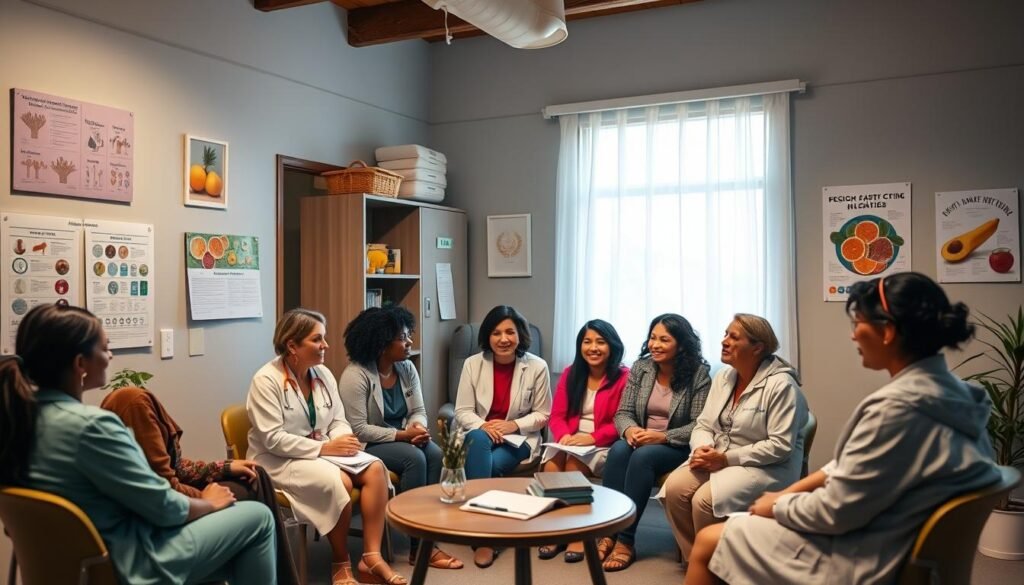Did you know that Polycystic Ovary Syndrome (PCOS) is found in about 8-13% of women who can have babies? It’s the top hormone issue they face. This big number shows how key it is to have support from others in handling PCOS symptoms. Women with PCOS deal with tough stuff like unwanted hair growth, irregular periods, and feeling down. These issues can really affect their daily life.
Having friends or a group to talk to is super important. It’s not just about sharing stories but also learning how to deal with everything. Studies show that women with good support are more likely to live healthier. With help from others and doctors, they can take on the emotional and mental challenges of PCOS.
Key Takeaways
- Community support plays a crucial role in managing PCOS symptoms.
- Women with PCOS are more likely to make lifestyle changes when they have strong support networks.
- Emotional support networks help reduce anxiety associated with symptoms like hirsutism and infertility.
- Shared experiences in a PCOS community can enhance emotional well-being.
- Education within the community can empower women to manage their conditions effectively.
- Engaging with healthcare professionals can lead to better health outcomes.
- Maintaining a balanced diet and regular physical activity is crucial for managing PCOS symptoms.
For more on how community support helps with PCOS, you can check out research here.
Introduction to PCOS and Its Challenges
Polycystic Ovary Syndrome (PCOS) is a tough endocrine disorder that affects many women, especially during their childbearing years. Its effects are seen in 4% to 10% of women globally. Women with PCOS may struggle with irregular periods, excessive hair growth, and gaining weight.
Living with PCOS is not just a physical battle. It also involves mental challenges. Many women feel bad about how they look and doubt themselves. These feelings can lead to anxiety and depression. This shows how crucial it is to have strong support and community involvement.
Women with PCOS can feel alone because of the condition’s stigma. This loneliness can stop them from getting help or talking about what they’re going through. It’s important to have community support for coping and to get better. Staying informed and actively managing the condition helps. To prevent PCOS problems, check out these health tips and lifestyle.
Understanding the Importance of Community Support
Community support is vital for women dealing with Polycystic Ovary Syndrome (PCOS). It affects up to 20% of women at a childbearing age worldwide. These women often struggle with weight gain, acne, and irregular periods. Such challenges can seriously impact mental wellbeing.
Having someone to talk to who understands can make a big difference. It brings a sense of belonging and cuts down on feeling alone. The importance of support is huge. Women are thankful for the kind words and encouragement from others in their community. Sharing this path helps in learning about managing PCOS and swapping advice.
Being part of a community makes the condition less scary. It breaks down stigma and empowers women to look after their health better. In places where it’s hard to find good information, community members are a gold mine. They share their own stories. This adds to what doctors say but might not fully explain. Women discover better ways to handle their healthcare by talking and sharing support. Joining support groups online can also help a lot.
Community support does more than help manage symptoms. It plays a big role in mental health. Knowing the full impact of PCOS, including risks like diabetes and high blood pressure, showcases the value of support. A supportive network promotes open talks which lead to better coping skills. This improves life quality for those with PCOS.
To learn more about how communities help women with PCOS, check out these detailed studies here.
Benefits of Community Support for Managing PCOS Symptoms
Community support is key for managing polycystic ovary syndrome (PCOS) symptoms and challenges. It helps people feel they belong, breaking the cycle of isolation many women feel. Here’s how a supportive community helps.
Emotional Support Network
Having an emotional support network provides comfort. It lets individuals talk about their feelings and PCOS challenges. This space helps lessen anxiety and boosts a sense of power. Overall, it leads to better mental health.
Peer Motivation and Shared Experiences
Peer motivation is crucial for coping with PCOS. Women share their journeys, encouraging healthy habits and exercise. This makes managing PCOS seem possible. Seeing others succeed motivates them to focus on their health too. This change is powerful.
| Benefits | Details |
|---|---|
| Reduced Anxiety | Support from others helps decrease feelings of isolation. |
| Increased Empowerment | Sharing challenges leads to a stronger sense of control over one’s health. |
| Healthier Lifestyle Choices | Peer motivation encourages better dietary and exercise habits. |
| Enhanced Coping Strategies | Exchange of effective management techniques among community members. |
| Emotional Resilience | Building connections fosters a sense of belonging and reduces stigma. |
In conclusion, joining an emotional support network and sharing with peers are crucial for women with PCOS. It builds relationships and encourages them to support each other on their paths.
How Community Support Facilitates Coping Strategies
Effective coping strategies can make a big difference for those with Polycystic Ovary Syndrome (PCOS). Community support is key. It provides a place where people can find and use these strategies together.
Creating a Safe Space for Expression
A supportive community allows for emotional expression. It’s a safe place for individuals to share their feelings. Dealing with PCOS can make someone feel alone and frustrated. But, in a supportive setting, they can talk about their experiences openly. This setting helps women connect through shared struggles, offering great comfort.
Regular meetings and workshops give emotional challenges a voice. This encourages deeper bonds and mutual understanding among members.
Access to Diverse Coping Techniques
Community groups also offer a range of coping strategies. Women share different methods, from mindfulness to changing their diet, to help each other cope. These shared tips form a helpful toolkit for symptom management. For instance, learning to manage insulin resistance can lead to better health changes.
| Coping Techniques | Description | Potential Benefits |
|---|---|---|
| Mindfulness | Practices like meditation and breathing exercises. | Reduces anxiety and supports emotional health. |
| Dietary Changes | Focuses on whole foods and balanced nutrients. | Helps manage weight and improves insulin sensitivity. |
| Physical Activities | Activities like yoga or walking with a group. | Boosts both physical and mental strength. |
| Support Groups | Meetings to share struggles and successes. | Builds a community feeling and lessens loneliness. |
Using these strategies within a community can help individuals deal with PCOS better. This leads to a better life.

Lifestyle Modifications Through Community Interaction
Community interaction is key for women managing PCOS. It brings a sense of community. It also offers a space to share health resources. This helps women make better health choices.
Sharing Health Education Resources
A supportive community allows for sharing health resources. This includes articles, studies, and expert advice on PCOS. Access to diverse materials improves understanding of healthy living.
Practicing Lifestyle Changes Together
Making lifestyle changes is easier together. Women can join group exercises, cooking classes, or wellness workshops. These activities help build healthy habits.
This community feel increases responsibility and bonds among members. As goals are pursued, the motivation from shared stories strengthens commitment to health.
| Activity | Benefits |
|---|---|
| Group Workouts | Encourages consistency and builds camaraderie |
| Healthy Cooking Classes | Teaches meal preparation for balanced nutrition |
| Support Groups | Provides emotional support and coping strategies |
| Educational Workshops | Increases knowledge on PCOS management |
Collective actions make a real impact for women with PCOS. Joining forces in a community promotes healthy habits and a better life quality.
Empowerment Through Community Engagement
Community engagement plays a vital role in empowering women with PCOS. By joining support networks, women feel a strong sense of belonging. This boosts their confidence and self-esteem.
Empowerment comes from sharing experiences and insights together. In this environment, women feel heard and validated.
Reducing Stigma Surrounding PCOS
Reducing the stigma around PCOS is crucial. Women challenge misconceptions by sharing their stories. This condition affects 8-13% of women, yet stigma remains.
Community engagement creates a supportive atmosphere. Here, topics like menstrual issues and hirsutism are discussed openly. This dialogue raises awareness and addresses misunderstandings about PCOS.
For example, many know of PCOS, but few fully understand it. Through conversation, members fill this knowledge gap.
Women sharing their stories help change how PCOS is viewed. This effort aims to reduce stigma and build a stronger, united community. Such groups often lead to better self-advocacy and healthcare.
Engaging in online groups, with over 340,000 contributions, shows the power of shared experiences. These connections improve knowledge and emotional well-being.
Community engagement offers a foundation for improved mental health and life quality for women with PCOS. It highlights the need for collective support.

| Statistics | Impact on Women with PCOS |
|---|---|
| 6-10% of reproductive-age women affected | Increased likelihood of emotional struggles |
| Higher anxiety and depression scores | Need for effective support systems |
| 84.3% familiarity with PCOS | Only 21.7% have adequate knowledge |
| Over 4,600 registered members in UK support group | Indicates a strong desire for community support |
Leveraging Digital Tools for Support
Digital tools have changed how women with PCOS find help. They offer ways to connect that can make coping better. Through online groups to webinars, tech is key in making bonds and spreading info.
Online Support Groups and Forums
Online groups offer a safe place for women to share and learn. They give lots of information and support. Studies show they help women feel less anxious and more confident about managing PCOS.
By talking about their ups and downs, members find a sense of belonging. This helps them grow personally.
Educational Webinars and Workshops
Webinars give crucial knowledge on handling PCOS. They deal with health education, coping, and lifestyle changes. Many women feel these sessions greatly boost their understanding of PCOS. This helps them take charge of their health.
This form of learning makes women more capable of making wise health choices.
| Method | Benefits | Impact on Awareness |
|---|---|---|
| Online Support Groups | Emotional support and peer motivation | Lower anxiety levels, increased confidence |
| Educational Webinars | Access to expert insights and health education | Enhanced understanding of PCOS management |
| Mobile Health Technologies | Improved disease management | Higher levels of awareness about symptoms |
The Role of Health Professionals in Community Support
Health professionals greatly help women with polycystic ovary syndrome (PCOS). They guide through the complex management of PCOS. It’s important for patients to feel supported and informed. Between 5% and 20% of women around the world are affected by PCOS.
When health professionals connect with community resources, women receive more support. Many women with PCOS struggle with challenges like anxiety. Health professionals give access to mental health resources. They aim to reduce depressive symptoms common in these women. They also educate about risks like type 2 diabetes and heart disease. This helps women make better health decisions.
Doctors, gynecologists, and mental health experts work together on PCOS care. This team approach helps understand PCOS better. It looks at physical and emotional aspects. Health professionals also consider alternative therapies with regular treatments. This creates a care plan that fits each woman.
Experts also focus on risk factors like cholesterol and insulin resistance. They talk about weight management too. This gives a complete view of managing health for women with PCOS. Their work helps improve life quality.
For more tips on managing PCOS, visit this link about PCOS management. Knowing how health professionals can help is key to managing this complex condition.

Long-term Benefits of Sustained Community Connections
Community connections are vital in managing PCOS symptoms for the long haul. These relationships create a place to share experiences and resources. This leads to better mental and physical health over time. Being part of a supportive group keeps people motivated and strong. This is vital when dealing with PCOS challenges.
Being connected helps improve mental health. Studies show women with PCOS often feel more anxious and depressed. Supportive groups lessen loneliness and provide emotional support. This positive setting improves coping skills and overall health.
Sharing knowledge within the community is key. Learning about healthy lifestyles and coping tricks from others is helpful. It’s especially important for those dealing with weight issues from PCOS. Working together on health goals can boost someone’s progress. It leads to a better quality of life.
To show the benefits of community involvement, here’s a table of key long-term advantages:
| Long-term Benefits | Description |
|---|---|
| Enhanced Mental Health | Regular interaction in supportive networks decreases anxiety and depression rates. |
| Improved Knowledge | Shared resources offer the latest information on managing PCOS effectively. |
| Increased Motivation | Continuous support from peers fosters commitment to health goals. |
| Better Coping Strategies | Access to diverse experiences aids in developing effective coping mechanisms. |
| Stronger Resilience | Consistent support encourages perseverance in the face of challenges. |
In summary, the long-term benefits of sustained community connections are huge. Being part of a supportive group helps people manage PCOS symptoms. It also improves their overall health and wellness. Over time, these community relationships help individuals flourish. They benefit from shared experiences and ongoing support.
Conclusion
Community support is key for many women managing PCOS symptoms. About 6% to 10% of women of childbearing age have PCOS. This shows how crucial strong support networks are.
Having support helps people deal with PCOS’s emotional effects. It also helps with overall wellness. This approach includes emotional and practical support from others.
Women can find useful health tips and resources through their communities. For example, changing lifestyles has helped with menstrual health and weight loss. Lifestyle changes have also reduced PCOS symptoms significantly.
Open talks about PCOS lets women take charge of their health together. They share advice and boost each other’s spirits. In the end, community support turns individual battles into collective victories. This makes managing PCOS a more positive journey.